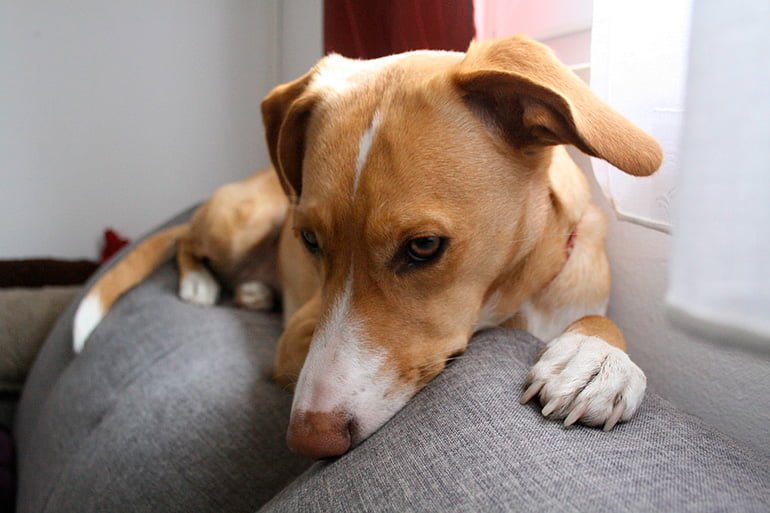There are many reasons that could explain why your dog is shaking. Some of them are completely natural, but others can be quite serious. So, what should you do if your dog is shaking?
By learning the main causes, you can verify if your dog is ok or figure out what is wrong so that you can make an appointment with your veterinarian. Today at Scooby’s Blog, we’ll review all the of reasons and explain the causes and possible solutions.
Contents
My dog shakes when it’s cold or rainy
Dogs have vital systems that are very similar to humans. That’s why, when it’s cold, their bodies start to send electric impulses to the muscles, which causes shaking or shivering. Just as we do when we are cold, dogs shiver to stay warm.
The movement of the muscles when shivering causes heat, which the dog then uses to relieve the feeling of cold. Keep in mind that dogs have a higher body temperature than humans, and even if they are covered in fur, they can still get cold.
Sometimes, a dog will shiver just because he is wet. This is totally normal, since the fur that normally protects him from cold is rendered useless, so his body starts to generate heat via muscle shaking.
To summarize, it’s completely normal for a dog to shake when he’s cold. To ensure he doesn’t get sick with anything related to the cold, like kennel cough, or just to make him more comfortable, always move your dog somewhere warm and keep him dry.
My dog is shaking for no reason
Many dog breeds have muscle spasms, which on the surface look exactly like shivering from cold, for example. These dogs aren’t suffering from any sort of illness and don’t need any treatment, and they’re not shaking because they’re cold or sick. It’s just genetics.
They might shake when they’re asleep or when you’re petting them. Really, these shakes can show up at any moment and without any real reason. Don’t worry about this sort of shaking; it’s completely normal.
The breeds most prone to shaking due to genetics are:
- Doberman
- Chihuahua
- Yorkshire
- Chow Chow
- Bulldog
- Samoyed
- Springer Spaniel
My dog shakes when he’s excited or scared
Nerves are another of the main reasons why a dog would start to shake. For example, when you’re playing with your dog and you take the ball and are about to throw it, it’s fairly common for the dog to start shaking from the excitement.
Or, when you’ve been away from your dog for a while, and he gets super excited to see you again, he might shake with excitement. They can’t help it; their nervous system is so active that the body starts shaking in order to calm it down.
A dog might also shake when he is afraid or anxious, as with many other animals. That includes humans, of course. Fear, anxiety and even depression can cause your dog to start shivering or to shake sporadically.
Preventing this type of shaking is easy when it’s due to excitement. Simply use relaxation techniques with your dog, and soon you’ll see that he stops shaking. However, shivering due to fear is impossible to eliminate, although you can help by socializing your dog and trying to help him overcome his fears.
My dog shakes in his sleep
This sort of shaking is totally normal. Most of the time, it’s because your dog is dreaming about running or about some situation that makes him excited or nervous. It’s also common for them to pant, growl or even bark as they shake.
It’s very important to respect your dog and not wake him up when he’s dreaming, because he could wake up disoriented and get scared. Worst case scenario, he could even bite (without meaning to, obviously).
Feeling cold could be another reason your dog shakes in his sleep, which you would know if the surrounding temperature was very low. In this case, you should cover him with a blanket or turn the heat on to keep him from getting cold.
Other reasons a dog could shake or shiver
Notwithstanding the reasons mentioned above, it’s possible that your dog’s blood sugar has crashed, causing him to shake. This mainly happens in smaller breeds and is very common in dogs with low muscle mass or very active puppies, like Boxers, and is easily solved by feeding your dog.
On the other hand, there are ailments like rheumatism or muscle pain from injury or wear that can cause your dog or certain parts of his body to shake, like one leg for instance. These shakes will only go away if you solve the root problem with the correct medication for the ailment, thus relieving the pain.
Other more serious diseases can also cause muscle spasms or shaking, like canine distemper, epilepsy or even ingestion of a toxin that is poisonous to dogs. When it’s due to poison, the dog may also be vomiting or panting, seem down or like he’s behaving strangely. It’s also common for a dog to shake because of a viral infection, in which case he also may not want to eat.
If you have any suspicion that your dog might be sick, have some ailment or has been poisoned, you absolutely must go to the vet. There is no home remedy or magic herb that can cure this kind of shaking. You need to solve the root problem for it to go away.
My puppy is shaking. What should I do?
When dealing with a puppy, you need to be very cautious. His immune system is still very weak and any problem or illness could be much more severe for him than in an adult dog.
If your puppy is shaking, make sure he isn’t cold, that he has eaten well and that his mood is normal. Puppies of the breeds mentioned earlier will also experience some shaking that can be considered normal. But… how can you tell if it’s normal or not?
We won’t get into any tricks or methodology here. If your puppy is shivering and you don’t know why, the best thing you can do is go to the vet’s office. Or, if you are on close terms with your vet, call them and explain the problem.
Puppies are so delicate that we would insist that a visit to a specialist is mandatory, even if just to rule out potential viruses.





